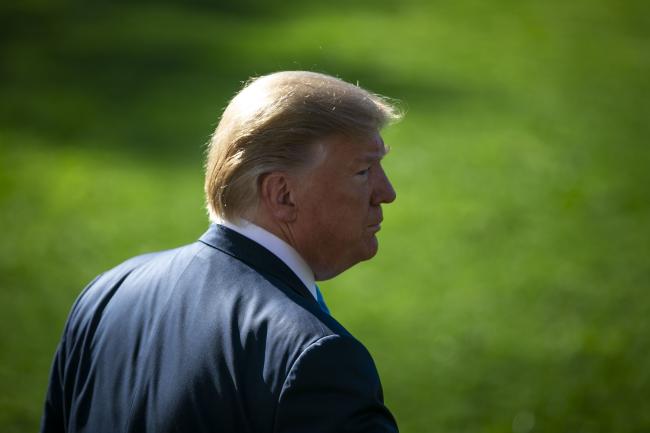(Bloomberg) -- Go inside the global economy with Stephanie Flanders in her new podcast, Stephanomics. Subscribe via Pocket Cast or iTunes.
The International Monetary Fund warned of “dangerous” consequences for the U.S. economy if moves such as President Donald Trump’s calls for Federal Reserve interest-rate accommodation lead to monetary policy mistakes.
“Undermining central-bank independence would be dangerous,” Tobias Adrian, director of the fund’s monetary and capital-markets department, said when asked about Trump’s recent criticism of the Fed. He spoke as the IMF’s spring meetings were getting under way in the U.S. capital.
The central bank in the world’s largest economy "is set up as a very independent institution. The governors and the chair are appointed for many years. It’s very much rooted in the institution that they don’t have to listen if they get calls” from politicians, Adrian said Wednesday in an interview in Washington.
Trump has repeatedly criticized the Fed for not doing more to boost the U.S. economy. Last week he called for lower rates and the restoration of the Fed’s bond-buying program, known as quantitative easing. In another effort to sway policy, the president has said he wants to nominate two political loyalists to its board of governors: former pizza executive Herman Cain and Stephen Moore, a fellow at the conservative Heritage Foundation.
The Fed left its policy rate unchanged last month, and Chairman Jerome Powell, whom Trump installed in February 2018, said rates could be on hold for some time as global risks weigh on the economic outlook and inflation remains muted. The IMF supports the Fed’s stance on monetary policy, Adrian said.
The importance of the Fed’s independence was demonstrated in the early 1970s, when President Richard Nixon pressured then-Fed Chairman Arthur Burns to lower rates, Adrian said.
“Many scholars have documents that show that might have led to overly loose policy in the U.S.,” he said.
There are plenty of cases around the world where governments lean on central banks to finance budget deficits through loose monetary policy, he said. “The central bank can be used as a tool for unsustainable fiscal policy."
The IMF’s latest Global Financial Stability Report warns that easy monetary policy and financial conditions may raise already high debt levels in advanced economies, raising "the specter of a deeper downturn in the future."
The IMF sees elevated vulnerabilities in sovereign and corporate assets, as well as among non-bank financial institutions, in major economies around the world. The credit tightening from last year’s market selloff was too fleeting to have an impact on financial stability, making it likely that vulnerabilities will continue to build, the fund said.
The Fed is among several major central banks to shift to a more dovish stance. The European Central Bank says it’s considering ways to cushion the impact on banks of negative interest rates, and the People’s Bank of China has eased borrowing costs to protect its economy from the trade war with the U.S.
Europe’s Struggles
If the euro area enters a downturn while the ECB’s deposit rate is still in negative territory, the region’s central bank will probably have to consider a range of unconventional measures, including setting targets for long-term interest rates and buying riskier assets such as corporate bonds, Adrian said.
“What you don’t probably want to do is go more negative at the short end. You’re already quite negative and at some point if you went more negative, that really generates the potential to move into cash,” said Adrian, referring to the incentive people would have to hold cash if deposit rates drop below zero.
New Conventional
Policy makers need to prepare for a world where unconventional monetary policies become the norm, he said. “We might have to get used to a world where these unconventional monetary policy tools are becoming more like a conventional monetary-policy tool.”
Adrian said the recent inversion of the yield curve is a “strong” market signal that investors should take seriously. Ten-year Treasury yields fell below three-month rates for the first time since 2007 last month. Inversion has traditionally been considered an omen of recession in the U.S.
“Every time the yield curve inverts, there are lots of memos written within central banks saying ‘this time is different,’” said Adrian, who worked at the Federal Reserve Bank of New York before joining the IMF. “At least three or four times, those memos look pretty bad.”
